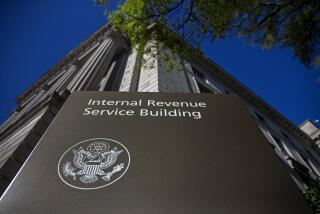Public’s Ignorance Allows Taxes--and the Real Culprits--to Hide
- Share via
Our government wants Americans’ money badly, as judged by the howls that arise--from those who worry they will get less of other people’s money--any time a tax cut is proposed. But the government wants to get it while bearing the least possible amount of political heat.
This is called squawk minimization , after a famous set of instructions on how to pluck a goose.
In this aim, politicians are aided by citizens’ abysmally weak economic understanding. For instance, a recent poll found fewer than two of five household heads able to correctly answer questions about basic economic information, much less analytical questions.
Abetted by this widespread economic ignorance, squawk minimization has led to a wide and growing variety of hidden taxes that give resources to the government but blame to others.
*
The corporate income tax, perhaps the most inefficient and distorting tax, is one example. Lulled by the fiction that businesses pay taxes--in fact, only people pay taxes--customers blame corporations for the increased prices that result, and employees blame them for the reduced wages. But government gets the money--along with accolades from taxpayers who think they are less burdened as a result. The same logic holds for excise taxes, import duties and restrictions, and business property taxes.
The employer half of Social Security is another way Uncle Sam minimizes taxpayer awareness of his hand in their pockets. Employers, knowing they must pay this 7.65% tax on top of wages, offer lower wages--or, failing that, eliminate jobs. So the employers’ half of Social Security really comes out of employees’ pockets, as do workers’ compensation and unemployment insurance premiums. But they blame employers instead of the government for the resulting underpayment for their skills. When you say “I was robbed” as you get your paycheck, you literally know only the half of it.
Mandated benefits are another multibillion-dollar form of hidden taxation, because they also come out of workers’ overall compensation. Mandating X or Y lets government claim credit for delivering the benefits, but companies get the blame when they offer lower wages or charge higher product prices to pay for them.
“Taxing the rich”--who are defined by most people as “anybody who makes more than me”--also hides taxes from the public. Unfortunately, it also reduces the incentive of the more affluent to use their assets to benefit others.
For instance, the luxury yacht tax did not harm “the rich” it was aimed at, as they had good alternatives, such as buying used or foreign yachts. Instead, boating industry workers--with few good immediate alternative uses for their skills--suffered job losses.
Another squawk-minimization variant is taxing those unable to vote on an issue--for example, high hotel taxes in tourist meccas and fee or facility charges at airports--because they will primarily be borne by visitors. Likewise, rent control “taxes” landlords, many of whom do not live locally, by forcing them to give lower rents to current residents.
Deficits are also hidden taxes, with those who are to be stuck with the bill hard to clearly identify. The same is true for the trillions of dollars of currently unfunded benefit promises to Social Security, Medicare and government pension plan participants. That’s why these issues are so hard to “solve,” despite everyone’s stated desire to do so. No one wants to be the one to be blamed for singling out which promises will be broken and who the losers will be--not so long as they can remain unknown.
*
At every level, much of government spending is financed with such hidden taxes, all in an effort to obscure both who really pays and how much they pay. To the extent that we underestimate those costs, we overestimate what the government can really do successfully and support government programs that we would oppose if we were more accurately informed.
Correctly evaluating government policies requires that we learn to count the “real” cost of existing and proposed programs, and only then ask if we are really getting our money’s worth. Opening our eyes to these far higher costs may well reduce what we want our “public servants” to do for us, rather than doing it ourselves.
More to Read
Inside the business of entertainment
The Wide Shot brings you news, analysis and insights on everything from streaming wars to production — and what it all means for the future.
You may occasionally receive promotional content from the Los Angeles Times.










